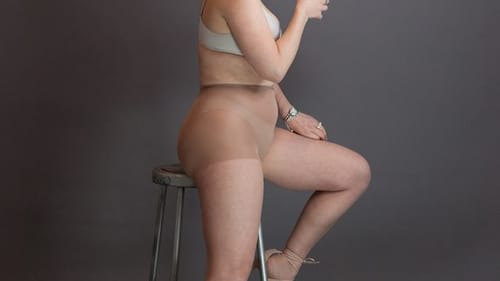Stay in the Loop
BSR publishes on a weekly schedule, with an email newsletter every Wednesday and Thursday morning. There’s no paywall, and subscribing is always free.
Becky's back
Philly Fringe 2018: Lee Minora’s ‘White Feminist’ (second review)

Becky is back, and she and the white women in her audience are all ready to celebrate our “good deeds and even better intentions.”
I first saw Lee Minora’s White Feminist back in March. It debuted under the Wilma’s HotHouse program to a crowd that flooded the waitlist of the one-night show. Just back from a successful Edinburgh run, the show has landed at Plays & Players' Skinner Studio for the Philly Fringe. Its preshow scene is a similar sea of waitlisted hopefuls who didn't get tickets early enough.
In this small black box, Minora’s often-strident performance (especially when she kicks off the show with a microphone) is occasionally deafening. But that sensation is actually a good metaphor for the relentlessly outsize presence of women like Becky (who does abjectly apologize for taking up too much space at the Women’s March).
Keeping up with the news
In a short speech following her show’s spring debut (directed by Alice Yorke), Minora promised the show would be back following further development. But besides some tweaks to the segments of Becky’s Time (the live taping of a daytime talk show that forms White Feminist's setting) the content here is largely the same, from costuming to staging to audience prompts.
The performance is so interactive, thanks to Minora’s brilliant in-character improvisation, that each night’s audience undoubtedly provides a fresh experience. But especially with the hurricane that is the U.S. news cycle, I’m surprised White Feminist hasn't evolved much since its premiere. Minora does work in mentions of Brett Kavanaugh and New York Times op-eds, but needling the audience about our tears in 2016 when Hillary lost feels a little like ancient history. I had hoped that this otherwise dynamite solo show would prove more nimble.

Proving the point
The topic is worth up-to-the-minute scrutiny, because there are white feminists and then there are white feminists. I spend a good chunk of my social-media time lurking on the Instagram feeds of women of color, such as activist and writer Rachel Cargle, whose “Unpacking White Feminism” lecture tour takes her across the country, educating us on the history of the ways American feminists and women’s suffragists have battled the patriarchy while riding high with white supremacy, up to the present day.
Cargle is quickly approaching 100,000 Instagram followers, and scores of white women constantly prove her points. Every time she explains that white woman are both victims of misogyny and, if not the intentional perpetrators, at least the beneficiaries of white supremacy, her white followers demand personal credit for the good work they are doing and inform Cargle that her antiracist message would be much easier for them to swallow if she were just nicer about it.
What do I do?
Minora’s Becky straddles this space, too. The audience guffaws at Becky’s chirpy narcissism, but there are also many raw, contemplative silences, mostly surrounding the topics of sexual harassment and assault. The white feminists Cargle deplores and Minora satirizes can’t or won’t process the truth that white women, collectively, are both oppressed and oppressors.
“What do I do?” Becky begs. “What do you do? How are we different?”
Ultimately, Minora’s Becky gains our sympathy, both in sharing her own experiences of misogyny and in her embodiment as a comedic figure who is more buffoonish than toxic. But the cumulative effects of white women’s incessant centering of ourselves in activist circles, our tone policing, and our outright insults to anyone who threatens our self-righteous feelings aren’t cause for sympathy and, for many, probably aren’t the stuff of comedy. Racism and misogyny continue to cost countless lives, and women of color are living at the nexus of both.
If you’re heading to White Feminist (and I strongly recommend you do), just make sure it’s not the only voice you’re taking in on the subject.
To read Mark Cofta’s review, click here.
What, When, Where
White Feminist. By Lee Minora, Alice Yorke directed. Through September 16, 2018, at the Plays & Players Theatre's Skinner Studio, 1714 Delancey Place, Philadelphia. (215) 413-1318 or fringearts.com.
Sign up for our newsletter
All of the week's new articles, all in one place. Sign up for the free weekly BSR newsletters, and don't miss a conversation.

 Alaina Johns
Alaina Johns